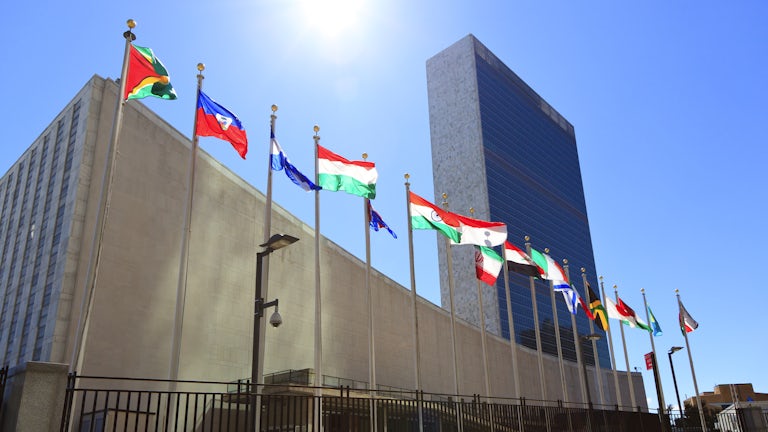
Strengthening rights and participation under mental capacity law
Dr Lucy Series and colleagues’ work on the Mental Capacity Act strengthened the rights and participation of people who may be considered to lack capacity to make or participate in decisions about their lives.
The work was central to new Court of Protection rules enhancing the participation of people who may lack capacity in proceedings, as well as new guidelines for health and social care professionals on supporting and including people in decisions, promoting engagement and improvement in major legislative reforms to safeguards, and protecting rights to liberty for people receiving health and care services.
Dr Series is a senior research fellow and lecturer in law, and has held a Wellcome society and ethics research fellowship since 2017. She originally intended to become a psychologist, but her experiences working in health and care settings changed that.
“My experiences in care were that people were living restricted lives, where their everyday rights to make decisions about their lives were being routinely trampled on. Even in the best services that I worked in, people would be denied, for example, the right to spend their own money on what they wanted to spend it on. And in the very worst services people were being treated really quite brutally, high levels of physical restraints, and restriction and chemical restraints.”
Around the time Dr Series was working in care, a new law came in called the Mental Capacity Act. The Act regulates whether the 2 million adults in England and Wales with mental disabilities can make key personal decisions for themselves, and empowers others to make these decisions on their behalf. Of these, 300,000 people are deprived of liberty by care arrangements in hospitals or care homes.
“I heard about the Act because I was about to trample on the rights of a care service user. I was a care coordinator, which means you’re based in the office designing the rotas, dealing with complaints, dealing with emergencies. This lady revealed to a carer a symptom which strongly indicated she had something very seriously wrong, perhaps even fatal. She didn’t want to see a doctor because she felt she had nothing worth living for. And I thought, I have to call the doctor, we can’t just let her die.”
Dr Series knew that she needed to consult with the woman’s social worker first. “I rang her social worker, who told me I couldn’t bring a doctor in when she’d asked us not to, as the woman had ‘capacity’. That was the first time I’d heard of this concept, even though it had been in law for years.
“I didn’t call the doctor; we dealt with it in a different way. We changed the rota so that her favourite carers went in every day. They tried to improve her life so that she wanted to live, and eventually she agreed to get treatment,” she says.
The Mental Capacity Act
Dr Series became, by her own admission, obsessed with the Mental Capacity Act, because she thought it was going to improve things for people in care.
“However, I couldn’t quite work out how the people that I had worked with who had been restrained, for example, who didn’t communicate verbally, could alert the justice system to their predicament. There didn’t seem to be any oversight or accessible means to challenge things.”
She changed her plans and decided to do a PhD looking at the rights of people in care. It took a while to find the right studentship, but eventually she got a place to do a PhD in law on the Mental Capacity Act.
“I started to take the Act apart, and realised that if the goal was to fix these problems, it wasn’t necessarily the best designed system to do so.”
She became intrigued by a scheme of deprivation of liberty safeguards which provide enhanced independent scrutiny and checks and balances for people who are ‘deprived of their liberty’ in hospitals and care homes.
“For the people I had worked with who were heavily restricted, heavily restrained, the safeguards didn’t require that they could call up a solicitor. The safeguards mean that independent specialist professionals would come and check out their situation, and they will have access to representation and advocacy.”
Along with Professor Phil Fennell and Dr Julie Doughty, with funding from the Nuffield Foundation, she also examined the Court of Protection, which adjudicates on questions of capacity and best interests.
“One of the big problems we found was that the person themselves was nowhere to be seen. When I started this research, it was almost unheard of for them to attend court to meet with the judge, even though there are European court rulings saying that it is really important. While doing the research, we managed to persuade the court to change the rules so that the judges had to at least consider meeting the person, and that started normalising it more.”
Deprivation of liberty safeguards
Her research around the deprivation of liberty safeguards started to gather momentum. She was contacted by a woman who knew of somebody who had been locked up in a terrible care home, and her mother – who was in her 80s – was trying to get her out using the deprivation of liberty safeguards. Dr Series gave them information about what they could do, and helped to find them a lawyer. She says, “To thank me, she took me out for dinner, and we were talking about how terrible the system is, and she turned to me and said, ‘Well, what are you doing about it?’. That was the real turning point for me, and I decided I was going to do something about it.”
Dr Series drew up a one-page document – ‘10 signs of trouble with the deprivation of liberty safeguards’. She put it online, and sent it to campaign groups, charities, MPs, and members of the House of Lords. She met with campaigners who wrote to the Joint Committee on Human Rights and suggested they take up an inquiry. They didn’t, but another concerned Parliamentarian decided to set up a House of Lords inquiry into the Mental Capacity Act.
The inquiry cited the research of Dr Series and Professor Phil Fennell. On the deprivation of liberty safeguards, it recommended that the government rip up the law and start again. The government asked the Law Commission to review the law, and it drew from the research findings on problems with the Court of Protection in its consultation paper.
It concluded that the existing system was failing to deliver effective rights of appeal, leading to its recommendations to reform the deprivation of liberty safeguards. The Law Commission then proposed a new framework, the Liberty Protection Safeguards. However, when these were adapted by the UK government and included in the Mental Capacity (Amendment) Bill [HL] 2018, it reduced the protection for individuals that the Law Commission had recommended.
“It was really catastrophic; the Bill was proposing that a care home could detain you with almost no oversight and block you from having an advocate if, in their opinion, you didn’t need one. How are you supposed to challenge them if you’re in there and you don’t want to be there, and they’ve decided that you shouldn’t be able to challenge them?” Dr Series says.
A two-pronged approach
Dr Series began a two-pronged approach. The first was public information. She used her blog to bring people’s attention to the Bill. She also worked with organisations like CHANGE and Inclusion London to produce accessible information about the bill.
“We worked with 39 Essex Chambers, and with a charity called CHANGE who produce accessible information, to produce a document saying that this is what the government is trying to do. Then another organisation – Inclusion London – went out and met with people with learning disabilities, met with carers, and used our document and asked, ‘What do you think about this?’. A report was written based on their feedback, and that was a great campaign tool. It got the word out about what was happening, and it involved a group of people who almost never contribute to the mental capacity law and policy that affects their lives.”
Her second prong was to contact people in the House of Commons and the House of Lords. She produced a series of research briefings on the Bill, which highlighted possible negative impacts, including:
- care home owners would have been able to decide whether or not somebody needed, or got access to, an advocate to help them challenge their placement or any restrictions
- detained people and their families would have no statutory right to information about their rights
- including the person being a danger to others as grounds for detention would be problematic, as mental capacity legislation should not extend into public protection.
These ‘fantastic briefings’, as described in House of Lords debates on the Mental Capacity Amendment Act, were used to understand, scrutinise, and amend the complex Bill in a tight timeframe. They were also used, reproduced, and cited by the Joint Committee on Human Rights.
The final Bill included changes that directly reflected the research:
- care providers will not be able to veto access to independent advocacy for detained persons
- detained people and their families have the right to accessible information about the safeguards and their rights
- the safeguards will not extend authority to detain under the Mental Capacity Act into the arena of public protection
- expanded provisions for independent reviews
- a government definition of ‘deprivation of liberty’ that conflicted with domestic and international legal authorities was removed from the Bill.
The Mental Capacity (Amendment) Act 2019 replaced the deprivation of liberty safeguards (DoLS) with the Liberty Protection Safeguards (LPS). These are due to come into force in the next few years. They affect at least 300,000 people in the UK, including around 180,000 in care homes.
Dr Series says, “We still ended up with a bill that’s imperfect, but we made some changes which made it less awful. Importantly, we got lots of people skilled up and knowledgeable about this area of law who wouldn’t otherwise have been, who can continue that advocacy.”
Social care detention
Dr Series is now focussing her work on what she calls ‘social care detention’. Her monograph, ‘Deprivation of Liberty in the Shadows of the Institution’, was published in March 2022.
“There are many other Western countries that now also regulate community care living arrangements as a ‘deprivation of liberty’, and some other countries, like Australia and France, that are quite resistant to recognising that people can be deprived of their liberty in care homes in the community. Activists and other people concerned with human rights are saying that you really need to recognise that a care home can actually be a space of detention, and you need to regulate it accordingly. I call this ‘social care detention’.”
Although on the surface, social care detention can appear less ‘serious’ than mental health detention, its timescales are typically much longer – sometimes a person’s last months or years, or sometimes an entire lifetime.
“It can impact on their ability to make a home, to form or maintain relationships, their entire sense of self. I’m saying, first of all, we need to recognise this and give it a name, which I’m calling social care detention. And then we need to think ‘What are the actual problems we’re trying to deal with here?’ and ‘What’s the best legal response?’.”
The next stage of her research will be to look at what actually happens on the ground when care is regulated as a ‘deprivation of liberty’ and what is happening in other states who are regulating social care detention.


Legal research
Our research explores transformations in communities and cultures, crime and security, law and religion, social care, disability rights, family dispute resolution, and the legal professions.
Meet the team
Key contacts
Publications
- Series, L. 2019. On detaining 300,000 people: the liberty protection safeguards. International Journal of Mental Health and Capacity Law 25 , pp.82-123.
- Series, L. , Fennell, P. and Doughty, J. 2017. Welfare cases in the Court of Protection: A statistical overview. Project Report.Cardiff: Cardiff University, School of Law and Politics
- Series, L. , Fennell, P. and Doughty, J. 2017. The participation of P in welfare cases in the court of protection. Project Report.Cardiff: Cardiff University
- Series, L. 2016. The place of wishes and feelings in best interests decisions: Wye Valley NHS Trust v Mr B. The Modern Law Review 79 (6), pp.1101-1115. (10.1111/1468-2230.12233)
- Series, L. 2015. Relationships, autonomy and legal capacity: Mental capacity and support paradigms. International Journal of Law and Psychiatry 40 , pp.80-91. (10.1016/j.ijlp.2015.04.010)
Further information
The Small Places – Dr Series’ blog
Deprivation of liberty in the shadows of the institution – read more about Dr Series’ work
Inclusion London – supporting inclusion for deaf and disabled people
CHANGE – a human rights organisation led by disabled people





Supported decision-making
Another strand of the work was around supported decision-making. Dr Series contrasted the approach to supported decision-making under the Mental Capacity Act with approaches associated with the UN Convention on the Rights of Persons with Disabilities (CRPD). She identified limitations in the Act’s respect for the person’s ‘wishes and feelings’, and recognition of a person’s preferred and trusted supporters. In comparison with other jurisdictions that have adapted their laws to reflect the CRPD, the Mental Capacity Act does not enable the person to nominate a designated person to support decision making, and the ‘best interests’ standard affords lower priority to the ‘wishes and feelings’ of the person.
“We’ve got these two competing visions of how we’re supposed to manage situations where people lack capacity. One is the Mental Capacity Act vision, which is coaching you to pass a capacity assessment, and then listening to you, but maybe not doing what you want. And the UN Convention is saying, no, ‘How do you want to be supported?’ and ‘We need to respect your wishes and feelings’.”
Dr Series’ work in this area was central to new the National Institute for Health and Care Excellence (NICE) guidelines to improve supported decision-making in clinical practice. NICE guidelines have to be followed by health and care professionals. Dr Series gave expert testimony – as one of five expert witnesses – to NICE, arguing for a stronger emphasis on how the person wishes to be supported, and respecting their wishes. These guidelines were published in 2018. While not law, they are seen as gold-standard guidance in health and care settings. Dr Series is hoping, however, that these recommendations around support and inclusion will also make it into the new code of practice when that is consulted on.